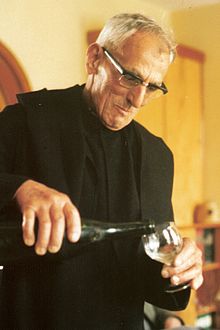Karl Kehrle
| Karl Kehrle ("Brother Adam") | |
|---|---|

1991 photo
|
|
| Born |
3 August 1898 Mittelbiberach, Germany |
| Died | 1 September 1996 (aged 98) Buckfastleigh, Devon, England, UK |
| Fields | Apiculture |
| Known for | Developer of the Buckfast bee |
| Notable awards | Order of the British Empire, German Bundesverdienstkreuz |
Karl Kehrle OBE (3 August 1898, Mittelbiberach, Germany – 1 September 1996, Buckfast, Devonshire, England, UK), known as Brother Adam, was a Benedictine monk, beekeeper, and an authority on bee breeding, developer of the Buckfast bee.
"He was unsurpassed as a breeder of bees. He talked to them, he stroked them. He brought to the hives a calmness that, according to those who saw him at work, the sensitive bees responded to." – The Economist, 14 September 1996
Due to health problems he was sent by his devoutly Catholic mother at age 11 from Germany to Buckfast Abbey, where he joined the order (becoming Brother Adam) and in 1915 started his beekeeping activity. Two years before, a parasite, Acarapis woodi that originated on the Isle of Wight had started to extend over the country, devastating all the native bees, and in 1916 it reached the abbey, killing 30 of the 46 bee colonies. Only the Apis mellifera carnica and Apis mellifera ligustica colonies survived.
He travelled to Turkey to find substitutes for the native bees. In 1917 he created the first Buckfast strain, a very productive bee resistant to the parasite. On 1 September 1919 Adam was put in charge of the abbey's apiary, after the retirement of Brother Columban. In 1925 and after some studies on the disposition of the beehives he installed his famous breeding station in Dartmoor, an isolated model to obtain selected crossings, which still works today. From 1950 and for more than a decade Adam continued his gradual improvement of the Buckfast bee by analysing and crossing bees from places all over Europe, the Near East and North Africa.
...
Wikipedia
